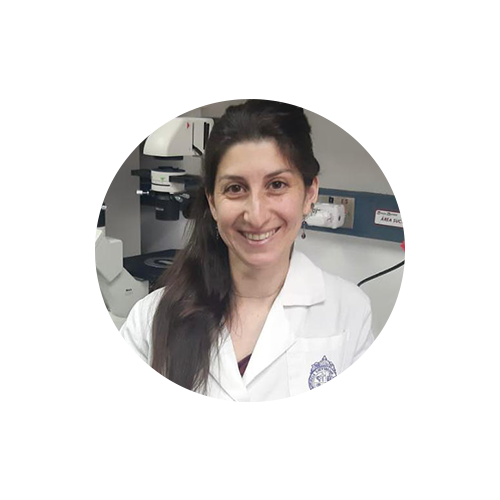Principal Investigator

Rafael A. Medina, PhD
Associate Professor
Pathology Advanced Translational Research Unit
Department of Pathology & Laboratory Medicine
View Faculty Profile
Dr. Rafael A. Medina is Associate Professor of Pathology and Laboratory Medicine, is part of the Emory Vaccine Center and is the Scientific Director of the Emory High Containment Facility at the School of Medicine. Dr. Medina has over >23 years of research experience on emerging and zoonotic viruses, including severe acute respiratory syndrome coronavirus 2 (SARS-CoV-2), Influenza viruses and Hantaviruses. Dr. Medina obtained his Ph.D. in Biomedical Sciences at The University of New Mexico, where he trained in biocontainment while conducting research with Sin Nombre and Andes Hantaviruses. During his Postdoctoral Fellowship in Virology under the mentorship of Dr. Adolfo Garcia-Sastre at the Icahn School of Medicine at Mount Sinai, his research involved studying pandemic influenza viruses, including the 1918 influenzas virus.
Current studies in the Medina Lab investigate molecular processes that are at the basis of pathogenesis caused by emerging RNA viruses. Using a systems biology strategy, the team seeks to investigate factors of the virus and the host that contribute to disease severity. To perform translational research, the Medina lab leverages in vitro and in vivo models of infection, and integrates virology, immunology, multi-Omics, molecular epidemiology and bioinformatics to provide in-depth understanding of host-pathogen interactions. Projects involve elucidating the early innate immune responses during respiratory viral infection and their impact on cellular and humoral immune responses, understanding differential host networks involved during resilience versus severe infection, and elucidating the impact of preexisting conditions on disease progression and outcome. The Medina lab also studies viral factors involved in zoonosis and replication; and in modulating the antigenic properties of human and animal influenza. Our overarching goal is to identify novel therapeutic targets and improve vaccine development.
Medina Lab Members

María José Avendaño, MSc
Visiting Fellow
Pathology Advanced Translational Research Unit
Department of Pathology & Laboratory Medicine
María José Avendaño obtained a degree in Biochemistry from the Universidad de Concepción. She later completed a Master's in Biological Sciences with a focus on immunology at the Pontificia Universidad Católica de Chile, where she is currently a PhD candidate. During her doctoral training, she investigated the humoral immune response to SARS-CoV-2 with a focus on identifying correlates of protection against severe COVID-19. Her research explores antibody effector functions, including Fc receptor engagement, complement activation, and subclass/isotype distribution.
She joined Dr. Rafael A. Medina’s laboratory in 2020, where she continues to study antibody-mediated immune responses in the context of infection and vaccination. Her work includes implementing and optimizing multiplex bead-based assay platforms and applying immunological profiling combined with multivariate statistical approaches—such as PCA and PLS-DA—to identify immune signatures associated with protective outcomes. Her current research interests include systems serology, humoral immunity, and the identification of immune correlates that can inform vaccine evaluation and the development of antibody-based interventions.

Caihong Bi
Post Doctoral Fellow
Pathology Advanced Translational Research Unit
Department of Pathology & Laboratory Medicine
Caihong Bi obtained a Ph.D. in Preventive Veterinary Medicine from the Chinese Academy of Agricultural Sciences (CAAS) in 2021. During his graduate training, he focused on viral immunology, studying how porcine reproductive and respiratory syndrome virus (PRRSV) modulates innate immune responses and characterizing novel viral epitopes recognized by monoclonal antibodies. Following his Ph.D., he joined Brigham and Women’s Hospital/Harvard Medical School (BWH/HMS) as a postdoctoral research fellow, where he investigated immune responses to SARS-CoV-2, integrating longitudinal ELISA, single-cell RNA-seq, LIBRA-seq, and CITE-seq to dissect factors regulating antibody durability.
He joined the Medina Lab at Emory University in September 2025, where he continues to study immune responses to viral infections using multi-omics approaches. His current research focuses on understanding how influenza infection shapes humoral and cellular immunity in humans.
RESEARCH INTERESTS
Caihong’s research aims to combine high-dimensional single-cell profiling and serological analyses to uncover immune correlates of protection and durable antibody responses. He is particularly interested in systems immunology approaches to investigate the interactions between viral pathogens, host immune memory, and B cell repertoire dynamics.

Chong Li, DVM, MS, PhD
Post Doctoral Fellow
Pathology Advanced Translational Research Unit
Department of Pathology & Laboratory Medicine
Chong Li obtained a DVM degree from the Northeast Agricultural University, China (2014), an M.S. in Preventive Veterinary Medicine from China Agricultural University (2016), and a Ph.D. in Veterinary Medicine from the University of Minnesota, United States (2022).
His Master's projects focus on epidemiological surveillance and biological characterization of the swine influenza virus to estimate its potential threats to the public and genetic evolutionary analysis of the H9N2 influenza virus in China. During his Ph.D., he explored the heterologous prime-boost vaccination in influenza control in pigs and genetically characterized the diversity and change of IAV within and between hosts under different immune pressures induced by vaccination and natural infection. After his Ph.D., Chong Li conducted research as a Postdoc Associate at the College of Veterinary Medicine, University of Minnesota. His project focuses on evaluating the genotypic diversity of influenza subpopulations at individual pig level in the farms and assessing the replicative fitness of virus subpopulations with distinct genotypes on primary respiratory cells from various locations of the swine and human respiratory tracts at monolayer and air-liquid interface conditions.
He joined the Medina Lab/PATRU in 2024 to conduct multiple influenza projects to understand the molecular basis of influenza zoonosis, pathogenesis, and immune evasion.
RESEARCH INTERESTS
He is especially interested in understanding how the genome traits facilitate virus infection, transmission, and evolution in hosts under different immune backgrounds, as well as identifying the virus and host factors contributing to virus outbreaks and their prevalence in nature.

Che-Chi Lin, MPH
Lead Research Specialist
Pathology Advanced Translational Research Unit
Department of Pathology & Laboratory Medicine
Jeffrey Lin obtained his Bachelor of Science in Biological Sciences with a minor in Chemistry from Colorado State University, Fort Collins (2021). He later completed his Master of Public Health (MPH) in Infectious Disease Epidemiology at Emory University (2024). During his undergraduate studies, he worked in Dr. Debbie Crans’ laboratory, investigating the biochemical properties and potential anti-cancer applications of vanadium (V) Schiff base ENSAL catechol compounds.With a strong foundation in epidemiology, Jeffrey’s career has evolved from analyzing population-level transmission dynamics of infectious diseases—such as Tuberculosis (TB), COVID-19, and Trachoma—to probing the molecular and immunological mechanisms that drive pathogen emergence. His public health training included collaborations with the Stop TB Partnership and Dr. Peter Cegielski of the Emory Tuberculosis Research Advanced Unit (TRAC), as well as work on innovative diagnostic methods for Trachoma both at the Task Force of Global Health (2022-2023) and The Carter Center (2023-2024).Motivated to bridge epidemiological insights with laboratory discovery, Jeffrey joined the Medina Lab in 2024. Here, he contributes to research in system serology and explores the immune landscape in response to SARS-CoV-2 and influenza. His research interests center on the host-virus interactome, non-human hosts, and cross-species transmission in influenza and emerging viral pathogens. Through this transition, Jeffrey remains dedicated to advancing the understanding of infectious diseases from both a population and molecular perspective.

Caitlyn Coleman
Training Fellow
Pathology Advanced Translational Research Unit
Department of Pathology & Laboratory Medicine
Caitlyn Coleman received her Bachelor of Science in microbiology, with a minor in infection control from the University of South Florida, in Tampa, FL. During this time, she conducted bacteriophage research through the SEA-PHAGES and SEA-GENES undergraduate research programs. In 2021, She traveled to Cornell University for the Molecular Biology and Genetics Research Experience for Undergraduates (REU) to train in bioinformatics. In 2022, She traveled to the University of Georgia to conduct a microbial source tracking project on Salmonella in creek systems through the Molecular and Synthetic Microbiology REU. She joined the Medina lab to conduct her thesis research for the Microbiology and Molecular Genetics (MMG) PhD program. She will investigate the role of air composition on the efficacy of Influenza A virus transmission using the guinea pig model. This model may guide interventions aimed at mitigating respiratory virus transmission in crowded areas, such emergency rooms and hospital settings.

Tamara Garcia, PhD
Scientist, Asst. (AR)
Pathology Advanced Translational Research Unit
Department of Pathology & Laboratory Medicine
Tamara Garcia Salum obtained her BS in Biochemistry from the Pontifical Catholic University of Chile, and her PhD degree in Biomedical Sciences from University of Chile. During her Ph.D. she identified a specific gene-expression signature including prognostic and predictive biomarkers (CXCR4 and CD32) in peripheral blood leukocytes (T/B lymphocytes and monocyte population) of immunotherapy treated melanoma patients. In 2014, she joined Medina’s lab. performing research focused on understanding immune responses during disease, in the context of infectious diseases. Currently, as assistant scientist, Tamara's research is focused on performing a systematic and comprehensive analysis of human host determinants to elucidate their contribution to severe infectious diseases, such as influenza and emerging viruses, including the recently identified SARS-CoV-2. She and colleagues are conducting cellular and molecular analysis, using Omics technologies, as well as single cell assays, among others, to evaluate clinical parameters, innate and adaptive immune responses and genetic factors, to provide valuable information for the implementation of treatments and immunotherapies for the general population.

Jannatul Raha, PhD
Post Doctoral Fellow
Pathology Advanced Translational Research Unit
Department of Pathology & Laboratory Medicine
Dr. Jannatul Ruhan Raha received her Bachelor of Science in Biochemistry and Biotechnology from North South University in Bangladesh and went on to earn her Ph.D. in Translational Biomedical Sciences at Georgia State University, specializing in viral immunology.
Dr. Raha has expertise in viral immunology, vaccine research, and preclinical animal models. Her doctoral studies focused on enhancing the efficacy of universal influenza vaccines by targeting conserved viral antigens. She is currently a postdoctoral researcher in the Medina Lab at the PATRU, where she is investigating how host determinants and immune responses influence disease outcomes in influenza infections, employing systems biology approaches to identify targets for improved therapeutic strategies.

Mauricio Morales
Visiting Fellow
Pathology Advanced Translational Research Unit
Department of Pathology & Laboratory Medicine
Mauricio Morales Olavarria obtained a BS degree in Biotechnology from Universidad Mayor in Santiago, Chile. Over the past seven years, his professional focus has been in the field of Bioinformatics, with a particular emphasis on Comparative Genomics. As a self-taught bioinformatician, he transitioned from wet lab research to dry lab, acquiring knowledge in different programming languages, which he applies to the development and implementation of computational approaches in biological research. As a member of the Medina Laboratory within the PATRU team, his work has concentrated on bioinformatic analyses of host-virus interactions, focusing on systems biology strategies to analyze multi-omics data.

